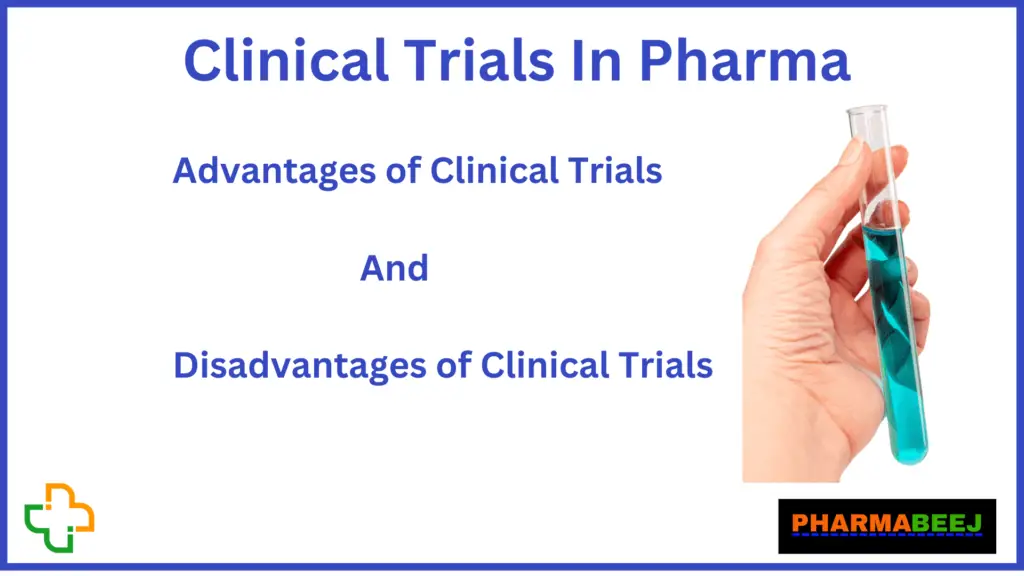Advantages and disadvantages of clinical Trials:
Clinical trials are research studies that involve people and are conducted to evaluate the effectiveness and safety of new medical treatments, such as drugs, devices, or behavioral interventions.
Clinical trials are a vital part of the development and approval process for new medical treatments and can provide several benefits to participants and to society as a whole. However, clinical trials also have some potential disadvantages that should be considered.
Advantages of clinical trials:
- Contribute to medical knowledge: Clinical trials help to improve our understanding of how diseases develop and how they can be treated or prevented.
- Access to new treatments: Participants in clinical trials may have access to experimental treatments that are not yet widely available or have not yet been approved by regulatory agencies.
- Personalized medical care: Clinical trials may offer the opportunity for participants to receive more individualized medical care, as treatment is tailored to their specific needs and medical condition.
- Contribute to the development of new treatments: By participating in a clinical trial, individuals can help contribute to the development of new treatments that may benefit others in the future.
Disadvantages of clinical trials:
- Risk of side effects: As with any medical treatment, there is a risk of experiencing side effects from the experimental treatment being tested in the clinical trial.
- Time and inconvenience: Clinical trials may require frequent visits to a medical center, which can be time-consuming and inconvenient for participants.
- Cost: Clinical trials may not cover all the costs associated with participating, such as travel or lodging expenses.
- No guarantee of benefit: There is no guarantee that the experimental treatment being tested in the clinical trial will be effective, and participants may not experience any benefit from participating.
It is important for individuals considering participating in a clinical trial to weigh the potential benefits and risks and to discuss their decision with their healthcare provider.
These are some advantages and disadvantages of clinical trials, but there are some other points to keep in mind.
There are a few additional points to consider when it comes to clinical trials:
- Ethical considerations: Clinical trials are subject to strict ethical guidelines to ensure the rights and welfare of participants are protected. This includes obtaining informed consent from participants and ensuring that they understand the purpose of the trial and the potential risks and benefits.
- Placebo control: Some clinical trials use a placebo, which is a dummy treatment that looks like the experimental treatment being tested but does not contain any active ingredients. The use of a placebo helps to ensure that the results of the trial are not influenced by the expectations of the participants.
- Randomization: Clinical trials often use a randomization process to assign participants to receive the experimental treatment or the placebo. This helps to eliminate bias and ensures that the results of the trial are as accurate as possible.
- Clinical trial phases: Clinical trials typically go through several phases, with each phase building on the results of the previous one. Phase 1 trials are small and focus on determining the safety of the experimental treatment. Phase 2 trials involve a larger number of participants and are designed to evaluate the effectiveness of the treatment. Phase 3 trials involve an even larger number of participants and are designed to confirm the effectiveness of the treatment and to compare it to standard treatments. Phase 4 trials, also known as post-marketing studies, are conducted after a treatment has been approved and is available on the market. These studies are designed to monitor the long-term safety and effectiveness of the treatment.

Also Read:
- Clinical Data management Interview Questions and answers
- What is a clinical trial in pharma?
- What is a phase 0 clinical trial?
- The practices with Data Integrity Issues (DI)
- HPLC Calibration parameters in Pharma
- FAQ on FDA’s Data Integrity
Refer YT Channel: Pharmabeejpro